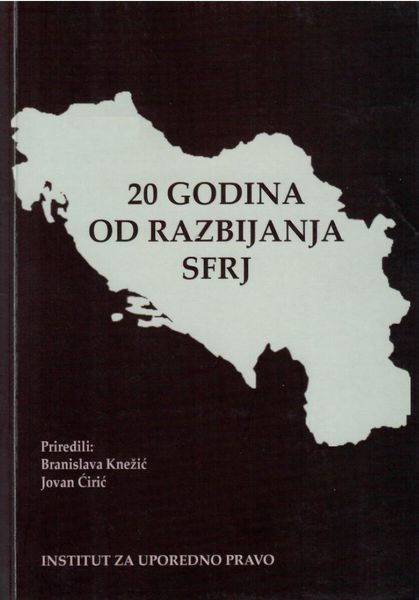
We kindly inform you that, as long as the subject affiliation of our 300.000+ articles is in progress, you might get unsufficient or no results on your third level or second level search. In this case, please broaden your search criteria.

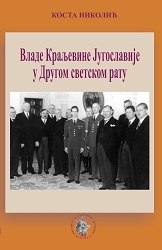
The Yugoslav Royal Government, having gone abroad, was accepted by the Allies as the only constitutional representative of the Kingdom of Yugoslavia. The reputation acquired by the events of March 27th additionally helped the Government and King Petar to be regarded as the holders of the national continuity of the Yugoslav state. With the recognition of the Government, the integrity of the territory of the Kingdom of Yugoslavia was acknowledged. The Royal Government was in favour of continuing the struggle against the occupying forces and therefore was accepted as a government of an Allied state. In a statement issued at the end of June 1941, British Prime Minister Winston Churchill confirmed that the Government of the Kingdom of Yugoslavia retained all the attributes of the sovereign power.
More...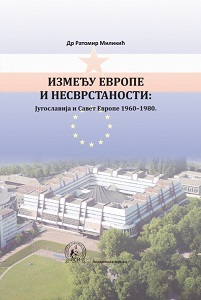
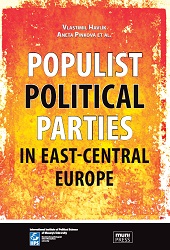
Populism is a term which has become established in the public consciousness. It has become a part of the rhetoric (as a form of attack) of political players and has also found a firm place in academic debates. This is despite the fact, or perhaps because, that a generally accepted and heuristically seamless concept of populism does not exist. The term populism somehow carries an automatic negative connotation. Party leaders are accused of populism, proposed solutions to political problems are attacked by their opponents as populist and, as such, summarily rejected. Populism in the public as well as journalistic discourse has in many cases become synonymous – as we describe in the theoretical chapter of this book – with demagoguery or rhetorical statements full of empty promises.
More...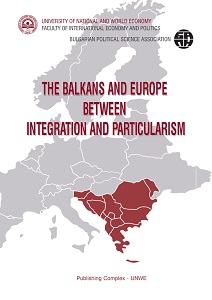
This volume is a collection of papers presented at the International conference THE BALKANS AND EUROPE BETWEEN INTEGRATION AND PARTICULARISM: CHALLENGES AND PROSPECTS, organized by the Faculty of International Economics and Politics at UNWE and the Bulgarian Political Science Association and held in Sofia on October 25-26, 2018. The conference invited presentations on a number of issues such as: The integration potential of the EU (28-1) and the “enlargement fatigue”; Ethno-politics and integration: dimensions, patterns and results in the EU and Western Balkans; The Bulgaria’s Presidency and the EU prospects of the Western Balkans; “Fatigued from waiting”: the countries of the Western Balkans; Bilateral relations in the Balkans: between historical mythology and pragmatism; Connectivity and cooperation in the Balkans: projects and realities, etc.Around fifty scholars and researchers – both established and younger ones – participated in the scientific forum representing a number of universities and research institutions from several countries (Bulgaria, Romania, Croatia, Northern Macedonia, Serbia, Kosovo, Russia). What is worth noting is the high rate of participation of doctoral students, as well as the contribution of undergraduate students from universities in Bulgaria and from MGIMO in Russia. Notably, some of the participants took part in the conference in absentia by poster presentations. The present volume contains the texts of those of the conference participants who sent their presentations in written form. The volume is structured in three parts except for the keynote speeches, which are presented separately as they were delivered during the Conference. The first part encompasses research papers dealing with issues pertinent to the whole European Union and various aspects of the integration processes. The focus in the second part is on the Balkans in the context of the EU integration. The papers in the third part deal with the Western Balkans in particular, featuring also case-studies on individual countries.
More...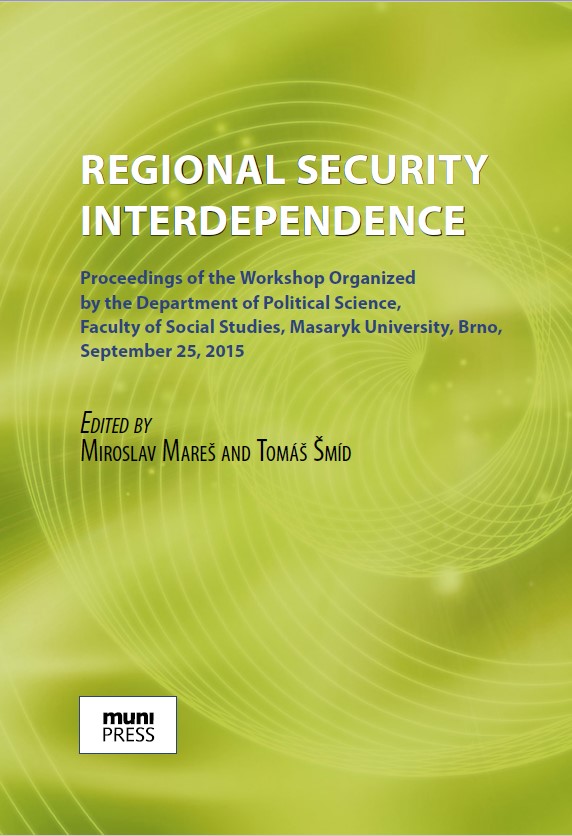
Contemporary security development is characterized by growing interdependence of security phenomena at local, national, regional and global level (Kegley, Wittkopf 2006). Within the world regions regional security complexes with their regional security orders were established (Stewart-Ingersoll, Frazier: 2012). The so called “new definition”of the regional security complex is related to „a set of units whose major processes of securitization, desecuritization or both are so interlinked that their security problems cannot reasonably be analyzed or resolved apart from one another“ (Buzan, Waever, de Wilde 1997: 201)“.
More...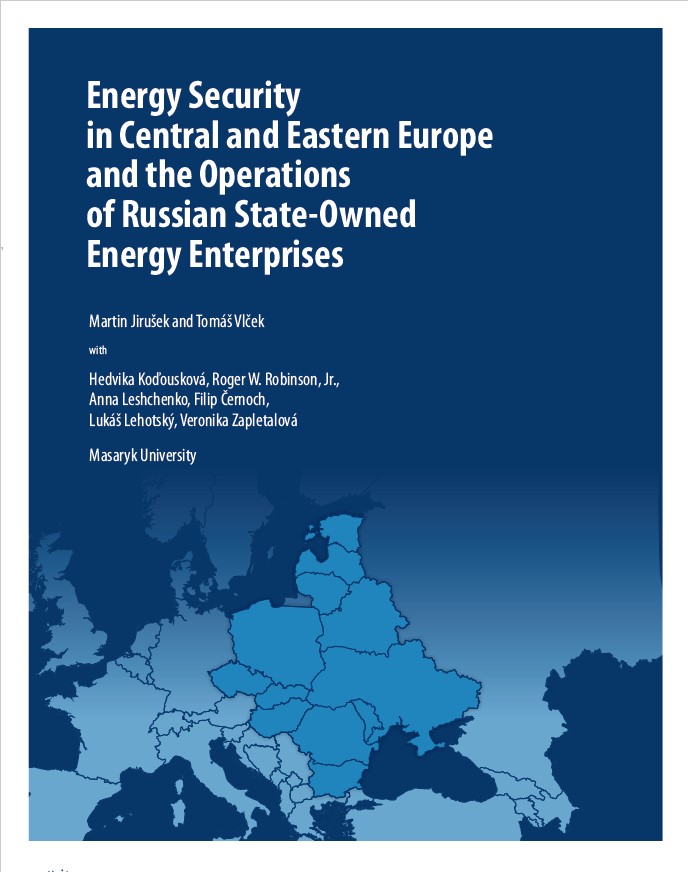
Dear distinguished reader, It is my utmost honor to present you the first volume of a series of energy security threat assessment studies stemming from the comprehensive, in-depth research of the Energy Security team at the Department of International Relations and European Studies of the Faculty of Social Studies of the Masaryk University conducted with the valuable support of, and in collaboration with, the Prague Security Studies Institute. This study addresses the rapidly evolving energy sector of Central and Eastern Europe, a sensitive, vulnerable region with regard to present and past Russian efforts to exercise varying levels of control over infrastructure, supply and pricing. The authors examine the operations and behavioral characteristics of two key Russian state-owned enterprises in the natural gas and nuclear energy sectors, namely Gazprom JSC and Rosatom State Atomic Energy Corporation, and seek to detect specific patterns and determining factors that shape their decision-making.
More...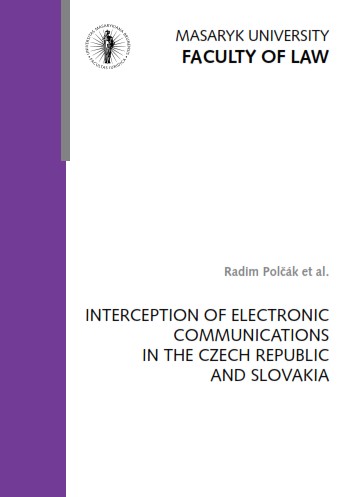
One of the most important forming factors of the distribution of public powers in the Czech Republic is its totalitarian history. There is a strong sense of distrust towards official institutions in the general public. It is probably due to this fact, that the procedures and powers of public bodies and agencies are set very rigidly. The principle of legality is set in Art. 2 para. 3 of the Czech Constitution (Act No. 1/1993 Sb. Constitution of the Czech Republic), which states that “State authority is to serve all citizens and may be asserted only in cases, within the bounds, and in the manner provided forby law” and in Art. 2 para. 2 of the Charter of Fundamental Rights and Freedoms (the Resolution of the Presidium of the Czech National Council of 16 December 1992 on the declaration of the Charter of Fundamental Rights and Freedoms as a part of the constitutional order of the Czech Republic No. 2/1993 Sb.), which states that “State authority may be asserted only in cases and within the bounds provided for by law and only in the manner prescribed by law”. Since all the public authorities authorized to intercept telecommunication fall within the scope of these articles, they are permitted to act only within the framework of what is expressly allowed for them by law.
More...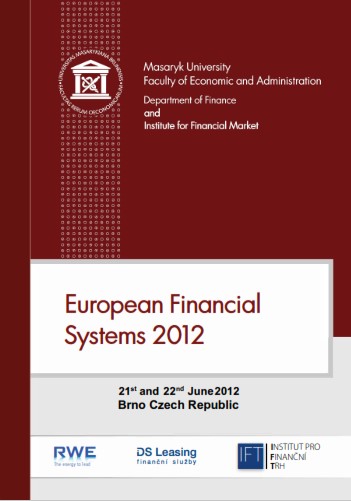
The methodical approach to project cost management in the construction industry requires the knowledge of accounting principles applicable to cost calculations. Such knowledge helps to exert actual control over expenses incurred on the execution of a construction investment project. There are various approaches to cost calculation for the presentation in the cost budget of a construction project. In practice, the methods which can be used for this purpose include expert estimation, estimation by analogy, parametric modelling and the specific identification method. The paper focuses on these methods and its main aim is to outline them and indicate their possible applications in economy, taking Poland as an example.
More...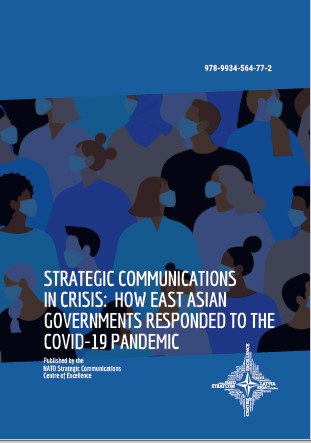
The COVID-19 outbreak has confirmed that, in an era of globalisation, local disasters quickly and unexpectedly escalate into world-spanning crises. What began as a local viral infection in Wuhan grew into a global pandemic in less than two months. The COVID-19 crisis is an unprecedented event in almost every way, not least from a strategic communications perspective. Faced with uncertainty about the development of the virus and its impact on society, governments are underenormous pressure to communicate policy initiatives and advice to their publics under extraordinary circumstances. While recognising that the crisis is still unfolding at a global level, this report explores how countries chose to act and communicate in relation to the outbreak of the virus during the initial period of the crisis. Although it is still far too early to evaluate the effectiveness of any approach, comparing and contrasting different courses of action at an early stage provides valuable insight into different crisis communication strategies when swift and unanticipated communications were required.
More...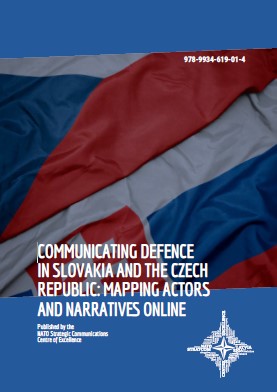
Slovakia has a much larger number of anti- Western actors communicating defence themes than the Czech Republic. There is a significantly higher penetration of anti-Western and pro-Russian narratives in Slovakia than in the Czech Republic. Slovak anti-Western actors are the best-performing group in our study. They consistently gain significantly more reactions, shares and comments than pro-Western actors in Slovakia or any actor in the Czech Republic. The Czech information space is predominantly negative towards Russia, the Slovak towards the West. Most posts in the Slovak infosphere were anti-Western in their geopolitical sentiment. The Czech infosphere was different in that most posts with negative sentiment were about Russia. The Slovak infosphere is much more clustered than the Czech infosphere. This is because of the stronger anti-Western leaning of Slovakia and because Slovak actors are more effective in communicating defence themes than their Czech counterparts. NATO was a significantly bigger topic in Slovakia than in the Czech Republic. While in the Slovak dataset there were almost 600 posts concerning NATO, there were less than 400 in the Czech Republic. But both countries had slightly prevailing negative geopolitical sentiment towards NATO. Following Russia’s aggression against Ukraine, the war dominated public discourse for most of 2022. Consequently, the majority of the content collected for this research concerned the war in Ukraine. Other prominent defence-related topics included military cooperation (training and weapons deliveries) and NATO, but even these topics were most often mentioned in the context of the war in Ukraine.
More...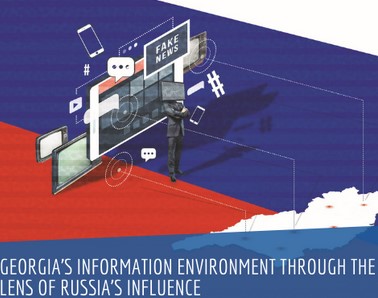
The executive summary provides a brief overview of the key ideas discussed in the publication. It also highlights questions for further discussion. Since the dissolution of the USSR, one of Russia’s main objectives has been to keep former Soviet republics under its informational, economic, and military influence. In the case of Georgia, its persistent westward outlook has triggered openly hostile rhetoric and action from Russia. In August 2008, Russia demonstrated its readiness to take military action to obstruct Georgia’s NATO integration and assert its dominance in the region. This, however, has only strengthened Georgia’s desire to pull away from Russian influence and integrate more closely with the European Union and NATO. In fact, Georgia plans to formally apply for EU membership in 2024. Georgia’s geopolitical setting is not one to be envied. Aside from NATO member Turkey, Georgia does not have Western-integrated allies in the region. It also cannot escape the economic and military influence of its larger neighbour. Russia and the Commonwealth of Independent States are Georgia’s main trade partners. Twenty per cent of Georgia’s territory has been occupied since the 2008 war, and creeping occupation, including regular kidnappings along the administrative borderline, continues. Apart from other factors, such as growing Chinese influence in Georgia, which are beyond the scope of this publication, Russia remains the main threat to Georgia’s stability and development. In terms of Georgia’s information environment, the Kremlin tries to exploit the following vulnerabilities: Georgia’s fragile economic situation, painful social issues, high political polarisation, media-party parallelism, conservativism and traditionalism, as well as certain Euro-Atlantic integration fatigue, where Georgians wish to see more progress. In addition, the occupied territories of Abkhazia and Tskhinvali/South Ossetia, as well as conflicts elsewhere in the region, such as Nagorno-Karabakh, remain additional pressure points.
More...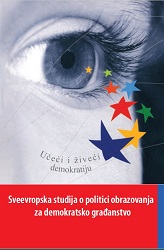
Obrazovanje za demokratsko građanstvo (ODG) je postao zajednički cilj obrazovnih politika u Evropi tokom kasnih 90-tih. ODG je bio snažno podržavan na političkom nivou, ali prilično nedosljedno pokrivan inicijativama vlada. Ova studija je iz tog razloga bila potrebna kako bi dala pregled politika koje su u upotrebi i diskrepanci između politike i prakse. Opšti trendovi su morali biti identifikovani zajedno sa pojedinačnim preporukama i idejama za dalju akciju. Sveevropska studija o politici ODG-a je pokrenuta 2002. godine. Njen glavni cilj je bio da označi nacionalne ODG politike u Evropi. Studija je uključivala saradnju velikog broja ljudi u Evropi. Posebno se treba zahvaliti autorima: gdinu César Bîrzéa (Rumunija), gdin-u David Kerr (Ujedinjeno Kraljevstvo), gdin-u Rolf Mikkelsen (Norveška), gdin-u Isak Froumin (Rusija), gdin-u Bruno Losito (Italija), gdin-u Milan Pol (Republika Češka) i gdin-u Mitja Sardoc (Slovenija), sa početnom podrškom gdin-a Cameron Harrison-a (Ujedinjeno Kraljevstvo) i gdin-a Bernd Baumgartl-a (Austrija).
More...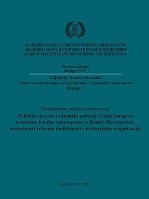
Od obnove državnosti Bosne i Hercegovine na Prvom zasjedanju ZAVNOBiH-a 1943. godine i donošenja Ustava Narodne Republike Bosne i Hercegovine 1946. godine Grad Sarajevo ima politički i ustavno-pravni status glavnog grada Bosne i Hercegovine. Status Sarajeva kao glavnog grada Bosne i Hercegovine utemeljen je i u Dejtonskom mirovnom sporazumu unutar Aneksa IV Ustava Bosne i Hercegovine. Tokom višedecenijskog razvoja Sarajevo je od 1945. do 1992. godine postiglo nove domete u urbanom, ekonomskom i kulturnom razvoju. Značajan uspon u ekonomsko-socijalnom i urbanom razvoju Sarajevo postiže u okviru projekta pripreme i održavanja XIV zimskih olimpijskih igara 1984. godine. Sa Zimskim olimpijskim igrama Sarajevo dobija planetarnu promociju svog dotadašnjeg urbanog i kulturnog razvoja kao glavnog grada Bosne i Hercegovine. Sarajevo je na temelju stečenog iskustva antifašističkog otpora okupatoru zemlje u Drugom svjetskom ratu uspješno organizovalo svoje ljudske potencijale za odbranu grada u vremenu njegove, u novijoj istoriji najduže vojne opsade u ratu protiv suverene države Bosne i Hercegovine od 1992. do 1995. godine. Time je Sarajevo, kao glavni grad suverene i nezavisne države Bosne i Hercegovine, imalo jednu od glavnih uloga u odbrani suvereniteta, integriteta i istorijskog multietničkog bića Bosne i Hercegovine. Dejtonskim mirovnim sporazumom Sarajevo je sačuvalo svoju istorijski oblikovanu urbanu cjelinu na prostoru: Starog Grada, Centra, Novog Sarajeva, Novog Grada, Ilidže i Vogošće. Međutim, u vremenu uspostavljanja Kantona Sarajevo 1996. godine ukinut je dotadašnji pravni status Grada Sarajeva kao autonomne jedinice lokalne samouprave. Iza toga je Skupština Kantona Sarajevo 1997. godine usvojila Amandman I na Ustav Kantona Sarajevo kojim je uspostavljen Grad Sarajevo, ali bez punih samostalnih nadležnosti i sa suženom teritorijalnom organizacijom. U okviru Centra za istraživanje razvoja lokalne i regionalne samouprave Odjeljenja društvenih nauka unutar Akademije nauka i umjetnosti Bosne i Hercegovine tokom 2019. i 2020. godine izvedeno je istraživanje na temu Sarajevo grad i regija u vremenu i prostoru – studija. U zaključnim stajalištima istraživački tim zagovara nužnost promjene postojećeg ustavno-zakonskog položaja Grada Sarajeva u pogledu nadležnosti i teritorijalne organizacije.1 U nastojanju da se dođe do sveobuhvatne naučne elaboracije bitnih aspekata reforme ustavno-zakonske nadležnosti i teritorijalne organizacije Grada Sarajeva inicirana je priprema i održavanje međunarodne naučne konferencije Političko-pravni i zakonski položaj Grada Sarajeva u sistemu lokalne samouprave u Bosni i Hercegovini: mogućnosti reforme nadležnosti i teritorijalne organizacije. Za zbornik radova je pripremljeno 15 referata. Autorski referati pripremljeni za zbornik radova konferencije obuhvataju više tematskih područja: ustavno-pravni, politološki i sociološki aspekti položaja Grada Sarajeva u sistemu lokalne samouprave Bosne i Hercegovine; komparativna analiza ustavno-zakonskog položaja glavnih gradova Slovenije, Hrvatske, Srbije i Bosne i Hercegovine, kao i referati iz oblasti urbanog i ekonomskog razvoja. Referate za konferenciju su napisali: prof. dr. Snežana Đorđević: Reforme organizacije i podele nadležnosti grada Beograda (2000–2022); prof. dr. Mehmed Bublin: Razvoj Grada Sarajeva; prof. dr. Ivana Domljan / prof. dr. Vjekoslav Domljan: Neminovnost razvoja znanjskih gradova; prof. dr. Elvis Fejzić: Nova politička vizija gradske autonomije: izazovi teritorijalne i institucionalne reorganizacije Grada Sarajeva; prof. dr. Franc Grad: Lokalna samouprava v Republiki Sloveniji s posebnim ozirom na položaj glavnega mesta; prof. dr. Zijad Hasić Komparativni pogled na normativno i institucionalno uređenje glavnih gradova Beograda i Zagreba s osvrtom na glavni grad Sarajevo; prof. dr. Pavle Mijović: Rekonfiguracija urbanog Sarajeva. Od agonističkog pluralizma prema društvenoj koheziji; prof. dr. Slaviša Orlović: Model izbora skupštine grada, gradonačelnika i gradskog veća Grada Beogradu u uporednoj perspektivi; prof. dr. Jasmina Osmanković / dr. sci. Nataša Pelja Tabori: Uloga Grada Sarajeva u razvoju regije – institucionalni i financijski kapacitet; akademik Mirko Pejanović: Ustavno-pravni položaj Grada Sarajeva u postdejtonskom periodu sa uklonom na mogućnost reforme nadležnosti i teritorijalne organizacije; dr. sci. Nataša Pelja Tabori / prof. dr. Jasmina Osmanković: Prostorno i urbanističko planiranje Sarajeva – prošlost, sadašnjost, budućnost; prof. dr. Elmir Sadiković: Glavni gradovi u nacionalnim sistemima lokalne samouprave – komparativna analiza Sarajeva, Beograda, Zagreba i Ljubljane; prof. dr. Kasim Trnka: Principi rehabilitacije ustavne pozicije Grada Sarajeva i mr. Amir Vuk Zec: Sarajevo će biti, sve drugo će proći. Važan doprinos u pripremi referata dali su recenzenti: dopisni član ANUBiH-a Fikret Čaušević, prof. dr. Danica Fink-Hafner (Fakultet za družbene vede v Ljubljani), prof. dr. Muhamed Hamidović, prof. dr. Ivan Koprić (Pravni fakultet Sveučilišta u Zagrebu), akademik Slavo Kukić, akademik Miodrag N. Simović i akademik Miloš Trifković Osim autorskih studija, odnosno referata za zbornik radova, priređen je i prilog u vidu analize o provedenom empirijskom istraživanju. U istraživanju je izvršeno anketiranje vijećnika u šest gradskih opština: Stari Grad, Centar, Novo Sarajevo, Novi Grad, Ilidža, Vogošća i Gradskom vijeću Sarajeva o njihovim stavovima o mogućnosti reforme nadležnosti i teritorijalne organizacije Grada Sarajeva. Kao prilog, pripremljen je i esej ratnog gradonačelnika Sarajeva, prof. dr. Tarika Kupusovića. Ideje i prijedlozi o mogućnosti reforme nadležnosti i teritorijalne organizacije Grada Sarajeva što su elaborirani u referatima za međunarodnu naučnu konferenciju mogu u godinama koje dolaze biti valjana osnova za donošenje odluka u nadležnim tijelima: Skupštini Kantona Sarajevo, Gradskom vijeću Sarajeva i opštinskim vijećima Starog Grada, Centra, Novog Sarajeva, Novog Grada, Ilidže i Vogošće o reformi nadležnosti i teritorijalne organizacije Grada Sarajeva.
More...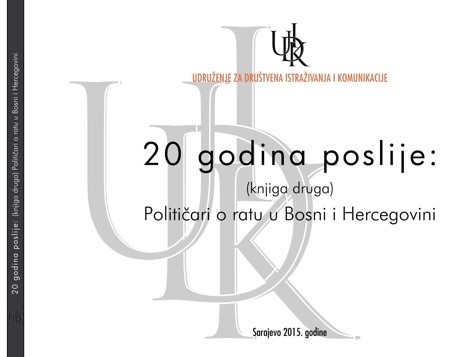
20 years after: Politicians on the war in Bosnia and Herzegovina is the title of the second book from the „20 years after“ edition, which aims to document the opinion, understanding and perception of the war in Bosnia and Herzegovina by eminent intellectuals who are direct witnesses of the war in Bosnia and Herzegovina, and many of them are still in public life and creating the political situation in our country. The publication represents the contribution of UDIK on the occasion of the 20th anniversary of the end of the war and the signing of the Dayton Peace Agreement. Through the standard journalistic interview, as the most popular way of communication in journalism, an effort is made to show what politicians and intellectuals think about the Bosnian War. The book contains nine interviews with Mladen Bosić, Živko Budimir, Dragan Čavić, Nerzuk Ćurak, Dušanka Majkić, Stjepan Mesić, Zekerijah Osmić, Nebojša Radmanović and Dubravka Stojanović.
More...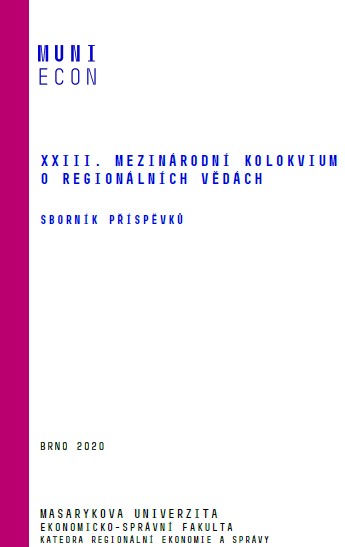
The conference proceedings consists of papers presented at the 23rd International Colloquium on Regional Sciences that was organized by Department of Regional Economics and Administration FEA MU. It contains 71 articles arranged by topic. The individual articles deal with e.g. socioeconomic disparities among regions, regional policy, territory attractiveness, tourism or regional public administration.
More...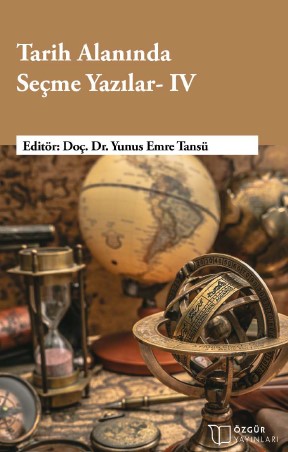
Kurtuluş Savaşı’nın ardından cephede kazanılan zaferin yeterli olmadığını her fırsatta dile getiren Mustafa Kemal Atatürk, asıl zaferin eğitim ve ekonomik kalkınma ile gerçekleşeceğini her fırsatta dile getirmiştir. Henüz cumhuriyet ilan edilmeden önce 8 Mart 1923 tarihinde Misak-ı Maarif başlıklı bir genelge yayınlayarak, gençlerin bilim, ilim ve ahlak bakımından aydınlatılması, cahilliğin yok edilmesi ve donanımlı gençlerin yetiştirilmesi konularına yer vermiş, milli eğitim ile ilgili önemli hükümler hazırlatmıştır. Cumhuriyetin ilk yıllarında temel hedef cehaletin giderilmesi ve okur yazar oranının artırılması olmuştur. Daha sonra cumhuriyet rejimi kültür harekatının en önemli unsurlarından biri Türk tarihi olmuştur. Çünkü bir milletin oluşumunda etkin olan en önemli kültür öğelerinden biri tarihtir. Bu bağlamda ulusal bilinç oluşturmak, toplumda milli birlik ve beraberliği sağlamak, milli kültür ve tarihi karaktere uygun eğitim önem arz etmektedir. Birinci Dünya Savaşı sonrasında gelişmiş ve gelişmekte olan ülkelerde bunun paralelinde Türkiye’de tarih öğrenmek ve öğretmenin önemi daha farklı bir anlam kazanmıştır. Türkiye Cumhuriyeti kurulduktan sonra toplumun, ihtiyaçları doğrultusunda eğitim programları düzenlenmiştir. Tarih eğitimi öğrencilerde ulus bilinci oluşturmak, tarihsel düşünme becerilerini geliştirmek için tarih öğretimi zorunlu kılınmıştır. Tarih öğrenmek toplumlarda manevi kültür değerleri, gelenek ve göreneklerine sahip çıkma sorumluluğu oluşturur. Toplumlar ait olduğu ulusu ve yurdunu daha yakından tanıma imkanına sahip olur. Bu nedenle tüm gelişmiş ve gelişmekte olan toplumlarda tarih, vatandaşlık bilinci oluşturma, ulusal bilinç oluşturma amacı ile eğitim öğretim müfredatında yer almaktadır.
More...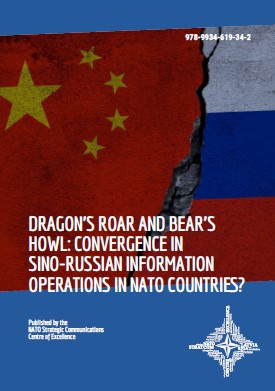
Russian – and increasingly also Chinese – information operations have in recent years been at the forefront of the threats assessment in NATO countries. Concerns about China’s power and its challenge to the existing Western-led international order, together with its attempts to increase its information influence, make the Chinese efforts in the information domain a strategic and security issue, leading to its explicit inclusion in the new NATO Strategic Concept at the Madrid 2022 summit. Russia’s fully fledged invasion of Ukraine in 2022 dramatically raised the stakes in countering long-standing Russian influence operations in NATO countries, with tensions reaching levels unseen since the end of the Cold War. The Russian war on Ukraine and its fallout have also put the relationship between Russia and China increasingly under the spotlight.
More...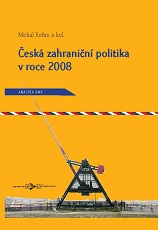
The book Czech Foreign Policy in 2008: Analysis of the IIR in all regards follows the analysis from last year, namely in its content and in the structure of individual contributions. This continuation of the series that began last year thus enables us to trace and compare the development of the Czech foreign policy in its political and ideational background, in its priorities, and in its execution and implementation, as well as to observe the influence and impact of particular relevant actors and the media con-text of the Czech foreign policy. Compared to the last edition, however, minor changes were made. The first parts of the individual chapters are not so much concerned with the conceptual basis of the Czech foreign policy (which did not undergo any progress). Instead, they focus on political discussion and the general political background of foreign policy. Certain changes were also made in the second chapter, which now solely analyses (audiovisual) media and their informing of foreign policy. This way, we were able to enhance our ability to capture the mutual relationship between issues that have the potential to initiate political and media debates on the one hand and actual foreign policy making and execution on the other. Another goal of the second chapter is to identify issues and agendas that stay beyond the media and political horizon. The year 2008 confirmed that only a small fraction of the Czech foreign policy agenda attracts a broader (public, media or political) interest, while the overwhelming majority of foreign policy is made by administrative and executive actors. Just like last year, the book is divided into six broader parts that reflect several distinctive dimensions of the Czech foreign policy, and these parts are in some cases further divided into separate chapters. The opening part, which is divided into two chapters, captures the continuing change of the political context of the Czech foreign policy making in 2008. It analyses the participation of different actors in the foreign policy making (the government, the president, the Ministry of Foreign Affairs, the parliament) and the media coverage of the Czech foreign policy. A special emphasis is put on the worsening of the Czech political milieu and its relation to foreign policy making. The following parts deal with the European and security dimensions of the Czech foreign policy. Both reflect those developments that were determining for the year 2008. These developments were namely the process of preparation for the upcoming Czech presidency of the European Council and issues connected to the reform of the Lisbon Treaty in regard to the European dimension and negotiations over the stationing of the U.S. anti -missile defense radar and Czech military missions abroad in regard to the security dimension. These more general parts are followed by several chapters analysing the Czech foreign policy towards selected countries and regions (central European countries, Germany, the United States, the United Kingdom, France, Russia, eastern European countries, Balkan countries, the Middle East, the Mediterranean and sub -Saharan Africa). We decided not to broaden the spectrum of the countries analysed as our goal is not to provide a complex overview of the Czech external relations. Instead, our goal is a deep analysis of the most relevant realms and issues of the Czech foreign policy. However, it is possible that the Czech policy towards the Latin American region will be newly included in the edition for next year. After the regionally and bilaterally oriented part comes a chapter dealing with the multilateral dimension of the Czech foreign policy. This part mostly focuses on the U.N. agenda and on the international law framework of the Czech foreign policy. As this international law view is relatively strong, the multilateral chapter mentions some issues that naturally fall under other parts of the book as well (e.g. Kosovo’s independence or the Russia -Georgian conflict). The last part of the book is devoted to a series of issue -based analyses. It begins with the Czech economic diplomacy and then goes on to discuss human rights, development aid and the cultural and public diplomacy dimensions in the Czech foreign policy. Finally, the book is concluded with a summary and a critical contemplation of the ideational and political background of the Czech foreign policy, also focusing on the questions of internal political communication and coordination in the foreign policy making and on the Czech foreign policy stereotypes. To secure a strong sense of continuity, the team of authors underwent only very partial changes. We believe that the second volume of Czech foreign policy analysis produced by this team will confirm our ambition to give rise to a tradition of deep and meaningful annually produced studies. Their assets should consist of both an up-to-date evaluation of the Czech foreign policy and building and providing a rich empirical and analytical database for later scholarship.
More...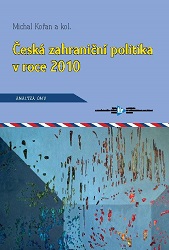
What was the Czech foreign policy in 2010 and why? A team of authors from the Institute of International Relations in Prague and other Czech partner institutions have been looking for answers to these questions for four consecutive years. The book Czech Foreign Policy in 2010: Analysis of the IIR is the fourth volume of a series focused on the Czech foreign policy. In 20 chapters by 19 authors, the book provides a deep exploration of the Czech foreign policy based on an unchanged analytical framework. The book begins with an analysis of the general political context of the Czech foreign policy. The basic argument is that despite the fact that the government of Petr Nečas had a considerable majority, the Czech foreign policy during this time partly remained hostage to two basic features of the Czech foreign policy of the previous years: indifference and turbulent and unstable political conditions. Yet, several positive tendencies in it were recorded, such as, for example, the general calming down of the foreign policy debate, the more coherent foreign policy program declaration of the new government, or the beginning of work on a new foreign policy conception which had been promised since 2006. The second chapter adds an important analysis of the media context of the Czech foreign policy making, proving that there is a long term tendency to-ward excessive selectivity in the major media while this selectivity is determined not by the relevance of particular issues but by other, less relevant factors. This selectivity goes hand in hand with the rising personalization and more emotional framework of Czech news making. The rest of the book is divided into several chapters, and each chapter reflects a selected dimension of the Czech foreign policy. Each chapter follows the same unifying structure: in the first part, the chapter analyses the nature of the political context of the given foreign policy dimension in order to illuminate the link between the political background and the actual foreign policy outputs, which are then explored in the second part. The third part focuses on the roles and involvement of particular actors participating in the foreign policy, and the fourth part aims at describing the media coverage and media context of a particular foreign policy agenda.
More...